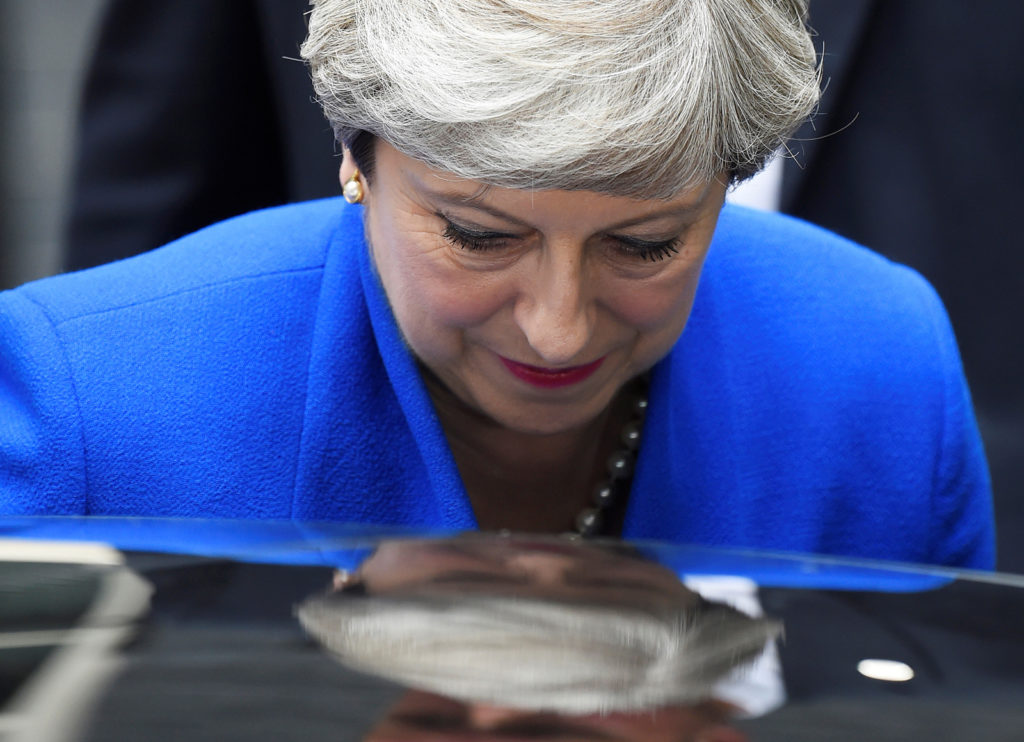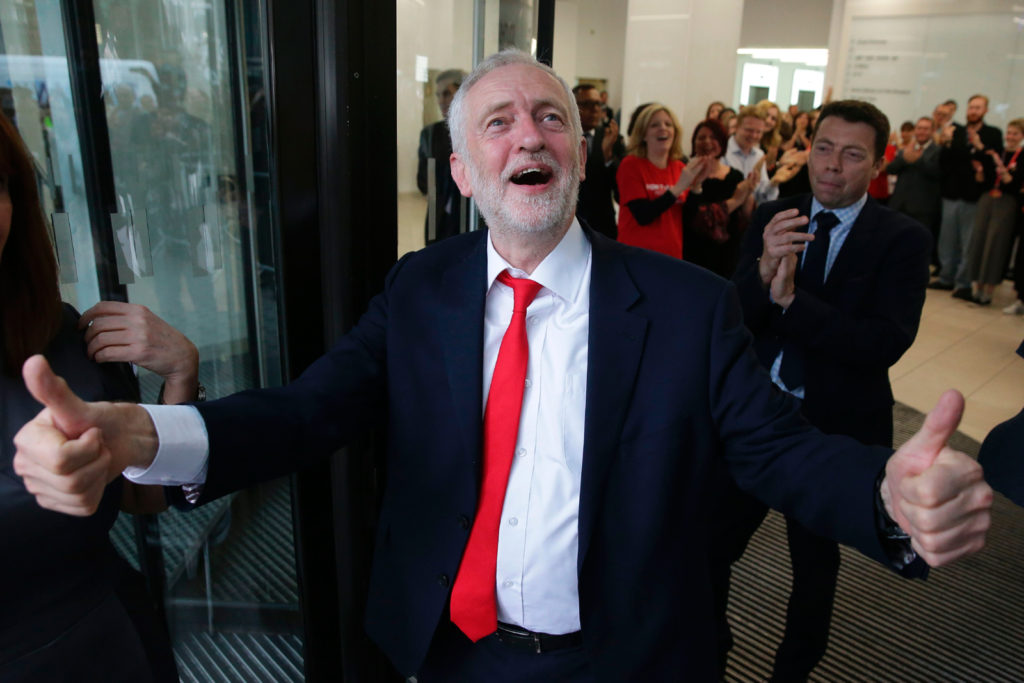Britain: The End of a Fantasy
EUROPE, 7 Aug 2017
Fintan O’Toole | The New York Review of Books – TRANSCEND Media Service

British Prime Minister Theresa May on her way to Buckingham Palace to ask the Queen’s permission to form a minority government, London, June 9, 2017.
Toby Melville/TPX/Reuters
10 Jun 2017 – To understand the sensational outcome of the British election, one must ask a basic question. What happens when phony populism collides with the real thing?
Last year’s triumph for Brexit has often been paired with the rise of Donald Trump as evidence of a populist surge. But most of those joining in with the ecstasies of English nationalist self-assertion were imposters. Brexit is an elite project dressed up in rough attire. When its Oxbridge-educated champions coined the appealing slogan “Take back control,” they cleverly neglected to add that they really meant control by and for the elite. The problem is that, as the elections showed, too many voters thought the control should belong to themselves.
Theresa May is a classic phony Brexiter. She didn’t support it in last year’s referendum and there is no reason to think that, in private, she has ever changed her mind. But she saw that the path to power led toward the cliff edge, from which Britain will take its leap into an unknown future entirely outside the European Union. Her strategy was one of appeasement—of the nationalist zealots in her own party, of the voters who had backed the hard-right UK Independence Party (UKIP), and of the hysterically jingoistic Tory press, especially The Daily Mail.
The actual result of the referendum last year was narrow and ambiguous. Fifty-two percent of voters backed Brexit but we know that many of them did so because they were reassured by Boris Johnson’s promise that, when it came to Europe, Britain could “have its cake and eat it.” It could both leave the EU and continue to enjoy all the benefits of membership. Britons could still trade freely with the EU and would be free to live, work, and study in any EU country just as before. This is, of course, a childish fantasy, and it is unlikely that Johnson himself really believed a word of it. It was just part of the game, a smart line that might win a debate at the Oxford Union.
But what do you do when your crowd-pleasing applause lines have to become public policy? The twenty-seven remaining member states of the EU have to try to extract a rational outcome from an essentially irrational process. They have to ask the simple question: What do you Brits actually want? And the answer is that the Brits want what they can’t possibly have. They want everything to change and everything to go as before. They want an end to immigration—except for all the immigrants they need to run their economy and health service. They want it to be 1900, when Britain was a superpower and didn’t have to make messy compromises with foreigners.
To take power, May had to pretend that she, too, dreams these impossible dreams. And that led her to embrace a phony populism in which the narrow and ambiguous majority who voted for Brexit under false pretences are to be reimagined as “the people.”
This is not conservatism—it is pure Rousseau. The popular will had been established on that sacred referendum day. And it must not be defied or questioned. Hence, Theresa May’s allies in The Daily Mail using the language of the French revolutionary terror, characterizing recalcitrant judges and parliamentarians as “enemies of the people” and “saboteurs.”
This is why May called an election. Her decision to do so—when she had a working majority in parliament—has been seen by some as pure vanity. But it was the inevitable result of the volkish rhetoric she had adopted. A working majority was not enough—the unified people must have a unified parliament and a single, uncontested leader: one people, one parliament, one Queen Theresa to stand on the cliffs of Dover and shake her spear of sovereignty at the damn continentals.
And the funny thing is that this seemed possible. As recently as late April, with the Labour Party in disarray and its leftist leader Jeremy Corbyn deemed unelectable, the polls were putting the Tories twenty points ahead and telling May that her coronation was inevitable. All she had to do was repeat the words “strong and stable” over and over and Labour would be crushed forever. The opposition would be reduced to a token smattering of old socialist cranks and self-evidently traitorous Scots. Britain would become in effect a one-party Tory state. An overawed Europe would bow before this display of British staunchness and concede a Brexit deal in which supplies of cake would be infinitely renewed.
There were three problems. Firstly, May demanded her enormous majority so that she could ride out into the Brexit battle without having to worry about mutterings in the ranks behind her. But she has no clue what the battle is supposed to be for. Because May doesn’t actually believe in Brexit, she’s improvising a way forward very roughly sketched out by other people. She’s a terrible actor mouthing a script in which there is no plot and no credible ending that is not an anti-climax. Brexit is a back-of-the-envelope proposition. Strip away the post-imperial make-believe and the Little England nostalgia, and there’s almost nothing there, no clear sense of how a middling European country with little native industry can hope to thrive by cutting itself off from its biggest trading partner and most important political alliance.
May demanded a mandate to negotiate—but negotiate what exactly? She literally could not say. All she could articulate were two slogans: “Brexit means Brexit” and “No deal is better than a bad deal.” The first collapses ideology into tautology. The second is a patent absurdity: with “no deal” there is no trade, the planes won’t fly and all the supply chains snap. To win an election, you need a convincing narrative but May herself doesn’t know what the Brexit story is.
Secondly, if you’re going to try the uno duce, una voce trick, you need a charismatic leader with a strong voice. The Tories tried to build a personality cult around a woman who doesn’t have much of a personality. May is a common or garden Home Counties conservative politician. Her stock in trade is prudence, caution, and stubbornness. The vicar’s daughter was woefully miscast as the Robespierre of the Brexit revolution, the embodiment of the British popular will sending saboteurs to the guillotine. She is awkward, wooden, and, as it turned out, prone to panic and indecision under pressure.
But to be fair to May, her wavering embodied a much deeper set of contradictions. Those words she repeated so robotically, “strong and stable,” would ring just as hollow in the mouth of any other Conservative politician. This is a party that has plunged its country into an existential crisis because it was too weak to stand up to a minority of nationalist zealots and tabloid press barons. It is as strong as a jellyfish and as stable as a flea.
Thirdly, the idea of a single British people united by the Brexit vote is ludicrous. Not only do Scotland, Northern Ireland, and London have large anti-Brexit majorities, but many of those who did vote for Brexit are deeply unhappy about the effects of the Conservative government’s austerity policies on healthcare, education, and other public services. (One of these services is policing, and May’s direct responsibility for a reduction in police numbers neutralized any potential swing toward the Conservatives as a result of the terrorist attacks in Manchester and London.)
This unrest found a voice in Corbyn’s unabashedly left-wing Labour manifesto, with its clear promises to end austerity and fund better public services by taxing corporations and the very wealthy. May’s appeal to “the people” as a mystic entity came up against Corbyn’s appeal to real people in their daily lives, longing not for a date with national destiny but for a good school, a functioning National Health Service, and decent public transport. Phony populism came up against a more genuine brand of anti-establishment radicalism that convinced the young and the marginalized that they had something to come out and vote for.
In electoral terms, of course, the two forces have pretty much canceled each other out. May will form a government with the support of the Protestant fundamentalist Democratic Unionist Party from Northern Ireland. That government will be weak and unstable and it will have no real authority to negotiate a potentially momentous agreement with the European Union. Brexit is thus far from being a done deal: it can’t be done without a reliable partner for the EU to negotiate with. There isn’t one now and there may not be one for quite some time—at least until after another election, but quite probably not even then. The reliance on a spurious notion of the “popular will” has left Britain with no clear notion of who “the people” are and what they really want.
___________________________________________
Fintan O’Toole is a columnist with The Irish Times and Leonard L. Milberg Visiting Lecturer in Irish Letters at Princeton. His book on George Bernard Shaw, Judging Shaw, will be published in Fall 2017.
DISCLAIMER: The statements, views and opinions expressed in pieces republished here are solely those of the authors and do not necessarily represent those of TMS. In accordance with title 17 U.S.C. section 107, this material is distributed without profit to those who have expressed a prior interest in receiving the included information for research and educational purposes. TMS has no affiliation whatsoever with the originator of this article nor is TMS endorsed or sponsored by the originator. “GO TO ORIGINAL” links are provided as a convenience to our readers and allow for verification of authenticity. However, as originating pages are often updated by their originating host sites, the versions posted may not match the versions our readers view when clicking the “GO TO ORIGINAL” links. This site contains copyrighted material the use of which has not always been specifically authorized by the copyright owner. We are making such material available in our efforts to advance understanding of environmental, political, human rights, economic, democracy, scientific, and social justice issues, etc. We believe this constitutes a ‘fair use’ of any such copyrighted material as provided for in section 107 of the US Copyright Law. In accordance with Title 17 U.S.C. Section 107, the material on this site is distributed without profit to those who have expressed a prior interest in receiving the included information for research and educational purposes. For more information go to: http://www.law.cornell.edu/uscode/17/107.shtml. If you wish to use copyrighted material from this site for purposes of your own that go beyond ‘fair use’, you must obtain permission from the copyright owner.
